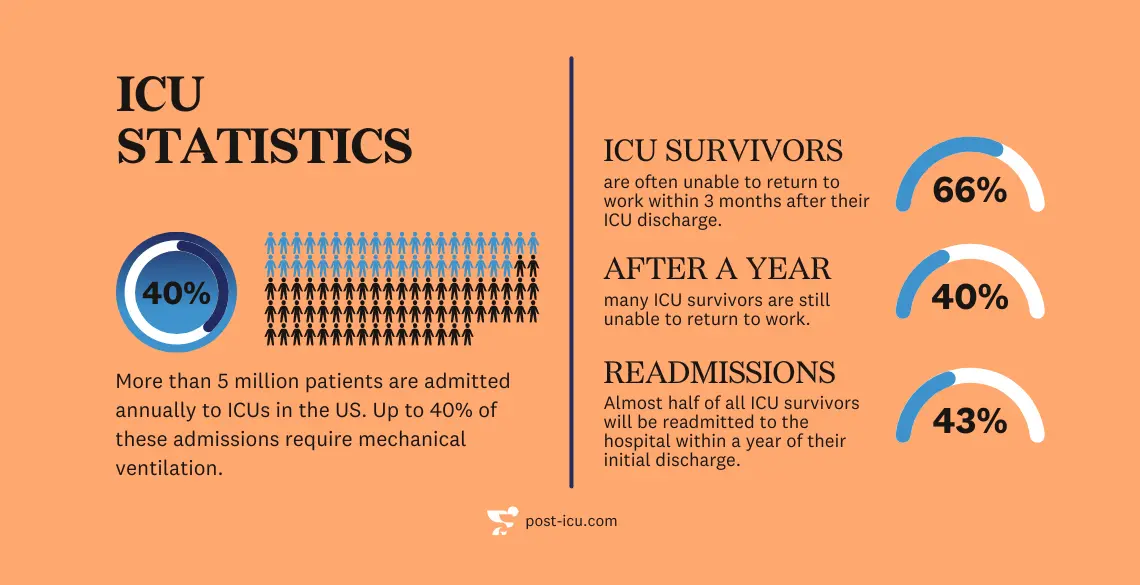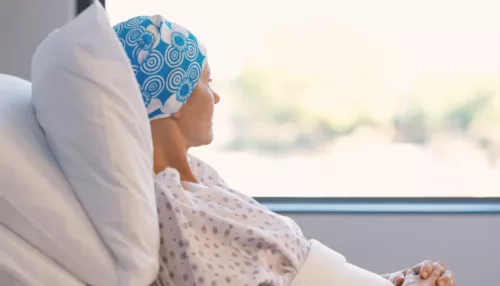The journey of recovery for Intensive Care Unit (ICU) survivors and their loved ones is both complex and multifaceted. This complexity is one of the reasons the recovery journey is not always well understood. Hospitals that strive to elevate their ICU patient experience first need to understand what they can improve on. Therefore, we have gathered 15 essential statistics that shed light on the challenges faced by ICU survivors and their families. In this article, we’ll dive into key findings from recent studies. Additionally, we share a cost-effective and scientifically validated method to enhance the ICU patient and family experience.
2 out of 3 ICU survivors don’t return to work within 3 months.
General ICU Statistics
More than 5 million patients are admitted annually to ICUs in the US. A substantial 20% to 40% of these admissions require mechanical ventilation. This statistic signals that many admissions concern highly severe cases. On average, patients spend 3.8 days in the ICU in the US. The care these patients receive is both intense and efficient.
ICU Survivor Employment Statistics
Within the first 1-3 months after ICU discharge, 2 out of 3 ICU survivors are not able to return to work. Looking at the longer term, the numbers are somewhat more positive: a year after discharge, 60% are able to return to work. However, research has found a decline between 6 and 12 months. This suggests that reintegration into the workforce may be short-lived for some. It is also unfortunate to note that the number of survivors who can return to work does not rise much more after this time frame of a year. It has been found that only 68% of ICU survivors have returned to work 5 years after discharge.
Being able to return to work is important for a variety of reasons. One is that having a job can help an ICU survivor heal mentally and psychologically. Having meaningful activities can help to feel like you are a part of society (again). Additionally, a job also helps to be more financially independent. That is important because studies have shown that large numbers of people who survive the ICU receive new disability benefits after their critical illness:
- At 12 months after ICU discharge, up to 27% of survivors receive disability benefits.
- At 76 months after ICU discharge, the percentage rises significantly to 89%.
All of these statistics highlight the long-lasting impact of critical illness on employment, as well as the need for sustained (state) support.
Economic Impact of Readmissions
A readmission to the hospital is not only a big burden on the ICU survivor and their family, but also on the economy. Readmissions within 30 days of ICU discharge cost over $2 billion annually. Regrettably, readmissions after surviving the ICU are not a rare occurrence. At 30 days after discharge, 15% of ICU survivors are readmitted to the hospital. After 1 year, this number increases up to 43%. That means that almost half of all ICU survivors will return to the hospital within one year after their initial discharge. These statistics underline the economic burden associated with post-ICU care and the urgent need for a better ICU patient experience.
Discover how Griffin Hospital increased their ICU patient experience effectively with Post-ICU.
ICU Survivors’ Quality of Life and Mental Health
However, the high economic costs aren’t the most prominent reason to step up for a better patient experience. The psychological toll an ICU admission takes on patients and their loved ones is the biggest price to pay. Shockingly, research has found that only 8% of all ICU survivors received new support from cognitive or mental health clinicians after their ICU period. This indicates that ICU survivors rarely get offered post-ICU mental support, even though Post-Intensive Care Syndrome (PICS) symptoms often involve mental health issues.
Furthermore, up to 80% of ICU survivors will develop cognitive impairments that can persist for years.
This is not the only way Post-Intensive Care Syndrome (PICS) commonly manifests itself though, as up to 57% of ICU survivors will develop symptoms of depression. Moreover, ICU survivors are unfortunately not the only ones who can get PICS. Their family members commonly develop PICS symptoms as well. Up to 75% of ICU patients’ family members develop anxiety, and one in every three families report taking medications for anxiety or depression when their loved one is discharged from the ICU.
An Effective, Scientifically Proven Method to Enhance ICU Survivors’ Patient Experience
Fortunately, researchers have found one intervention that significantly reduces the risk of developing PICS: keeping an ICU diary. Not only do ICU diaries help prevent the development of PICS symptoms, but they have also been shown to significantly enhance the quality of life for patients. In other words, ICU diaries act as a powerful tool in the recovery process and overall ICU experience.
Our digital diary, Post-ICU, is a cost-effective way of elevating the ICU patient and family experience. Post-ICU has been scientifically validated: 98% of ICU patients’ relatives found it easy to use the Post-ICU digital diary. The Post-ICU diary proves that technology to improve the ICU experience doesn’t have to be complicated. This user-friendly, yet innovative digital diary will increase ICU survivors’ quality of life significantly.
Conclusion
The statistics surrounding post-ICU recovery paint a vivid picture of the challenges survivors face. From the complexities of returning to work, to the lasting impact on mental health: recognizing these realities is crucial in shaping support systems and interventions. To improve the overall ICU patient and family experience, professional caregivers and hospital management should aim to provide holistic care that goes beyond the medical realm.
Sources
Please find the source material for this article, and more literature on Post-Intensive Care Syndrome, ICU diaries, and ICU patient experience here.






